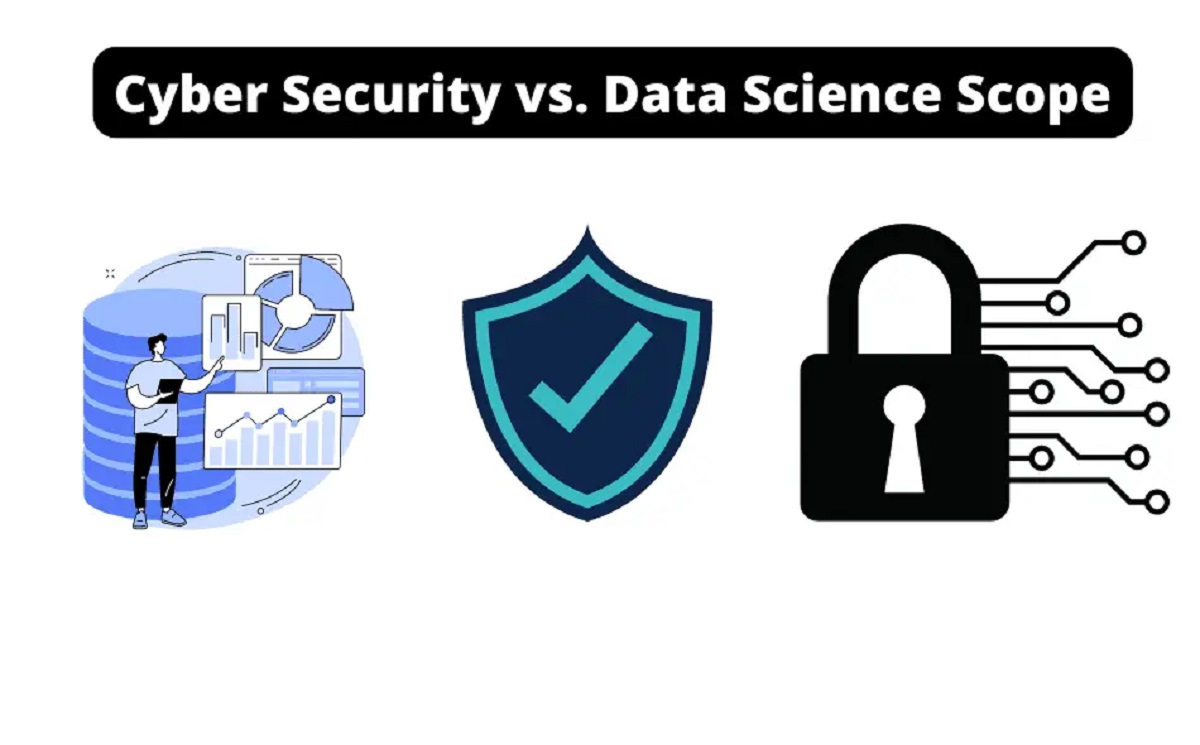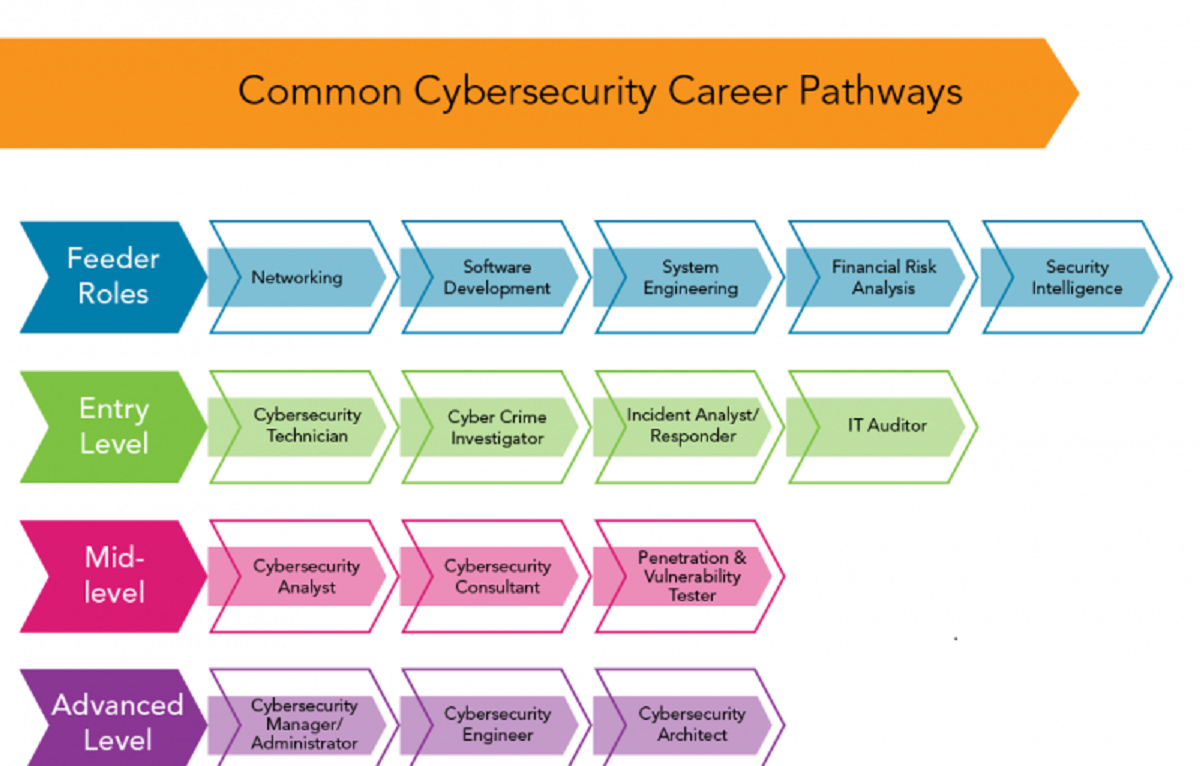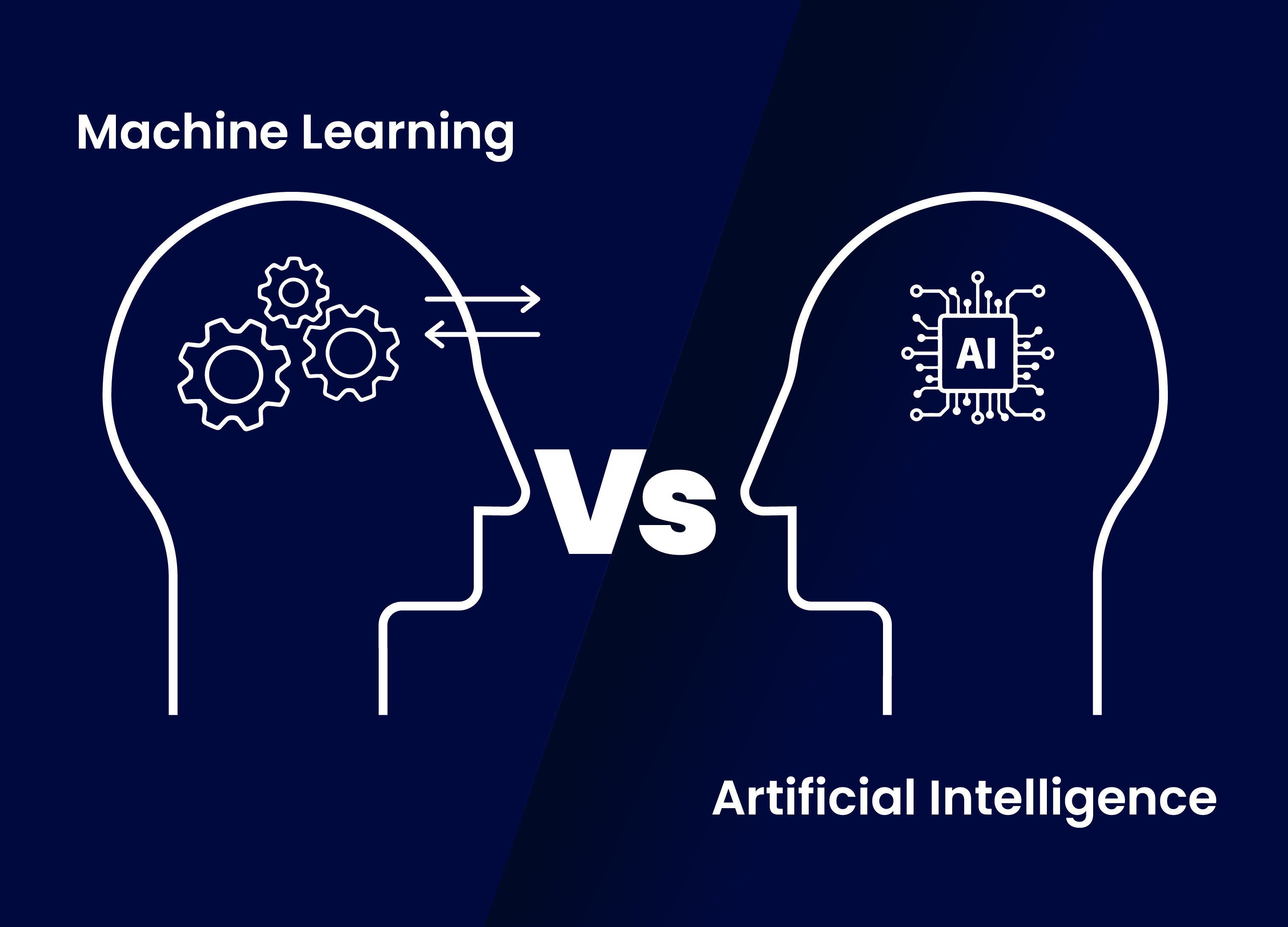Introduction
Welcome to the ever-evolving realm of technology and its impact on our society. As our dependence on digital platforms grows, so does the need to protect our valuable data from cyber threats. This has elevated the significance of cybersecurity and data science in today’s world.
Cybersecurity and data science are two domains that play crucial roles in ensuring the safety, privacy, and integrity of information in the digital landscape. Both fields have witnessed exponential growth in recent years, attracting professionals with their promising career prospects.
However, aspiring professionals may find themselves pondering which field offers a better scope in the future – cybersecurity or data science? In this article, we will delve into the nuances of both fields, exploring their importance and potential for growth. By the end, you will have a clearer understanding of the future prospects and opportunities within cybersecurity and data science.
Let us embark on this journey of discovery and exploration into the realms of cybersecurity and data science.
What is Cybersecurity?
Cybersecurity is the practice of protecting computer systems, networks, and data from unauthorized access, breaches, threats, and attacks. With the exponential growth of digital technologies, the need for robust cybersecurity measures has become paramount.
Cybersecurity encompasses a wide range of strategies, technologies, and practices aimed at safeguarding sensitive information and preventing malicious activities. It involves the implementation of measures to identify potential vulnerabilities, detect and respond to security incidents, and mitigate risks.
One of the main objectives of cybersecurity is to protect the confidentiality, integrity, and availability of data. Confidentiality ensures that only authorized individuals have access to sensitive information, while integrity focuses on maintaining the accuracy and reliability of data. Availability ensures that information is accessible to authorized users when needed.
Cybersecurity comprises various layers of protection, including network security, application security, user awareness training, data encryption, access controls, and incident response planning. These layers work in tandem to create a robust defense against potential threats.
Moreover, cybersecurity extends beyond just protecting organizations and individuals from external attacks. It also involves addressing internal threats, such as unauthorized insider access, human error, and negligence.
In today’s digital landscape, cyber threats are constantly evolving and becoming more sophisticated. Cybercriminals employ various techniques, including phishing, malware, ransomware, and social engineering, to exploit vulnerabilities and gain unauthorized access to systems and data. As a result, the demand for cybersecurity professionals continues to rise, with organizations across sectors seeking experts to safeguard their sensitive information and prevent potential financial losses, reputational damages, or legal issues.
With the increasing interconnectedness of devices through the Internet of Things (IoT) and the rapid adoption of emerging technologies such as artificial intelligence and cloud computing, the importance of cybersecurity is only expected to grow in the future. As cyber threats become more advanced, cybersecurity professionals will play a crucial role in protecting our digital infrastructure and ensuring a safe online environment for individuals and organizations alike.
What is Data Science?
Data Science is a multidisciplinary field that combines statistics, mathematics, programming, and domain expertise to extract meaningful insights from data. It involves the process of collecting, analyzing, interpreting, and visualizing large volumes of structured and unstructured data to uncover patterns, trends, and relationships that can drive informed decision-making.
Data Scientists utilize a wide range of tools and techniques, including statistical modeling, machine learning algorithms, data visualization, and data mining, to analyze complex data sets and extract valuable information. They have the ability to handle massive amounts of data and transform it into actionable insights.
The role of a Data Scientist encompasses tasks like data cleansing, data preprocessing, exploratory data analysis, predictive modeling, and data-driven storytelling. They work closely with stakeholders to identify key business problems or research questions and utilize data-driven approaches to find solutions or generate recommendations.
Data Science finds applications in various fields, including healthcare, finance, marketing, social media, cybersecurity, and transportation, to name a few. It plays a significant role in improving decision-making processes, optimizing operations, and driving innovation.
One of the key assets of Data Science is its ability to uncover hidden patterns and insights from large and complex data sets. By leveraging advanced algorithms and machine learning techniques, Data Scientists can identify trends and make predictions that can have a profound impact on business strategies.
Furthermore, Data Science is closely related to other disciplines such as Artificial Intelligence (AI) and Machine Learning (ML). While Data Science focuses on extracting insights from data, AI and ML deal with the creation of intelligent systems and algorithms that can learn from data and make predictions or decisions autonomously.
The demand for Data Scientists has been skyrocketing as organizations realize the potential of data-driven decision-making. With an increasing amount of data being generated every day, there is a need for skilled professionals who can extract valuable insights and help organizations stay competitive in the data-driven era.
In the future, Data Science is expected to continue its exponential growth, driven by advancements in technology, the proliferation of data, and the need for data-driven decision-making across industries. As organizations strive to harness the power of data, the demand for Data Scientists with expertise in data analysis, machine learning, and data visualization is likely to soar.
Importance of Cybersecurity
In today’s interconnected world, cybersecurity has become of paramount importance. It plays a critical role in protecting sensitive information, maintaining the integrity of systems, and ensuring the privacy of individuals and organizations. Here are some key reasons why cybersecurity is crucial:
- Protection against cyber threats: Cybercriminals are constantly evolving and finding new ways to exploit vulnerabilities in computer systems and networks. Cybersecurity measures help defend against various types of attacks, such as malware, ransomware, phishing, and social engineering, reducing the risk of data breaches and financial losses.
- Safeguarding sensitive information: In the digital age, organizations collect and store massive amounts of sensitive data, including personal information and financial records. Cybersecurity ensures that this information remains confidential and protected from unauthorized access or disclosure.
- Maintaining business continuity: Cyber attacks can disrupt operations, causing financial losses and damaging the reputation of an organization. Implementing robust cybersecurity measures helps mitigate the risk of downtime and ensures the smooth functioning of critical systems and processes.
- Compliance with regulations: Many industries have regulations in place to protect customer privacy and data security. Adhering to cybersecurity best practices helps organizations meet regulatory requirements and avoid legal consequences.
- Preserving trust and reputation: A data breach or security incident can severely damage an organization’s reputation and erode customer trust. By prioritizing cybersecurity, businesses demonstrate their commitment to protecting their customers’ data, strengthening relationships and preserving their reputation.
- Securing the Internet of Things (IoT): With the proliferation of connected devices in homes, offices, and industries, ensuring the security of the Internet of Things is vital. Cybersecurity measures protect IoT devices from potential attacks that could disrupt critical services or compromise user privacy.
- Defending against state-sponsored cyber attacks: Governments and nation-states engage in cyber espionage or cyber warfare activities that target critical infrastructure, government systems, or private sector organizations. Strong cybersecurity measures are essential to protect against these advanced threats.
As technology continues to advance, the importance of cybersecurity will only increase. With the growing adoption of emerging technologies such as artificial intelligence, cloud computing, and the Internet of Things, the need for robust cybersecurity measures becomes even more critical to safeguard our digital infrastructure and ensure a secure and trusted digital environment.
Importance of Data Science
Data Science has emerged as a vital field in today’s data-driven world. It offers numerous benefits and plays a crucial role in various domains. Let’s explore the importance of Data Science:
- Informed decision-making: Data Science empowers organizations to make well-informed decisions based on data-driven insights. By analyzing large and complex datasets, Data Scientists can identify valuable patterns, trends, and correlations that can help businesses optimize their strategies and drive growth.
- Improved operational efficiency: Data Science enables organizations to streamline their operations and enhance efficiency. By analyzing data, businesses can identify areas of improvement, automate processes, and make data-driven decisions that optimize resource allocation and improve productivity.
- Enhanced customer experience: By leveraging data, businesses can gain a deeper understanding of their customers. Data Science allows companies to personalize marketing efforts, tailor product recommendations, and offer personalized experiences, ultimately enhancing customer satisfaction and loyalty.
- Predictive analytics: Data Science empowers organizations to predict future trends, behaviors, and outcomes. By utilizing machine learning algorithms, businesses can make accurate predictions about customer preferences, market demand, and potential risks, enabling them to proactively adapt and make informed decisions.
- Data-driven innovation: Data Science provides a foundation for innovation and new product development. By analyzing data and identifying market trends, organizations can uncover new opportunities, develop innovative solutions, and stay ahead of the competition.
- Optimized marketing and sales: Data Science enables businesses to gain insights into customer behavior, preferences, and purchase patterns. This information helps optimize marketing campaigns, target specific customer segments, and improve sales strategies, resulting in increased customer acquisition and retention.
- Improved healthcare outcomes: In the healthcare industry, Data Science plays a vital role in predicting disease outbreaks, analyzing patient data, and optimizing treatment plans. By leveraging data, medical professionals can make more accurate diagnoses, identify high-risk patients, and improve patient care.
- Data-driven decision-making: Data Science empowers organizations to make data-driven decisions based on objective insights rather than relying on intuition or guesswork. This leads to more informed and effective decision-making, reducing the likelihood of errors or biases.
Data Science is transforming industries across the globe by harnessing the power of data. As businesses continue to collect and generate massive amounts of data, the importance of Data Science will only grow. Its ability to uncover meaningful insights, drive innovation, and optimize operations positions it as a critical discipline, shaping the future of organizations across various sectors.
Scope of Cybersecurity in the Future
The future holds immense opportunities and challenges for the field of cybersecurity. As technology continues to advance and our dependence on digital platforms grows, the scope of cybersecurity is expected to expand exponentially. Here are some key factors contributing to the promising scope of cybersecurity in the future:
- Rising cyber threats: With the increasing complexity and interconnectedness of digital systems, cyber threats are becoming more sophisticated and frequent. This creates a constant demand for cybersecurity professionals to develop and implement robust defense strategies to safeguard sensitive information and protect against evolving threats.
- The Internet of Things (IoT): The widespread adoption of IoT devices in various sectors has opened up new attack vectors and vulnerabilities. The IoT presents complex challenges in terms of securing connected devices, networks, and data. Cybersecurity experts will play a vital role in developing solutions to protect IoT devices and maintain the security and privacy of individuals and organizations.
- Emerging technologies: As emerging technologies such as artificial intelligence, machine learning, blockchain, and quantum computing continue to advance, cybersecurity will play a crucial role in ensuring their secure implementation. The integration of these technologies into various industries will require cybersecurity professionals to address their unique challenges and mitigate potential risks.
- Regulatory compliance: Governments and regulatory bodies are increasingly imposing strict data security and privacy regulations. Organizations must comply with these regulations to avoid legal consequences and reputational damage. As a result, the demand for cybersecurity experts who can ensure compliance and protect sensitive information will continue to grow.
- Cloud computing: As more businesses shift their operations to the cloud, ensuring the security of cloud-based systems and data becomes paramount. Cybersecurity professionals will be needed to implement effective security measures, monitor cloud environments, and protect against unauthorized access or data breaches.
- Cybersecurity skills gap: Despite the growing demand for cybersecurity professionals, there is a shortage of skilled individuals in the field. This skills gap presents significant career opportunities for those pursuing a career in cybersecurity. Organizations are actively seeking talented individuals with expertise in cybersecurity to fill these roles.
- Growing awareness and investment: As cyber threats continue to make headlines, there is a growing awareness of the importance of cybersecurity at both the individual and organizational levels. This increased awareness has led to a surge in investments in cybersecurity measures, creating more job opportunities and career growth in the field.
Given these factors, the scope of cybersecurity in the future is immense. Cybersecurity professionals will be in high demand across various industries, ensuring the security and integrity of sensitive information, protecting against cyber threats, and helping organizations navigate the constantly evolving digital landscape.
Scope of Data Science in the Future
The field of Data Science is poised for an exciting and promising future as the world becomes increasingly data-driven. With the exponential growth of data and advancements in technology, the scope of Data Science is expected to expand significantly. Here are some key factors contributing to the vast scope of Data Science in the future:
- Explosion of data: As the volume, variety, and velocity of data continue to increase, organizations across industries will turn to Data Science to harness the potential of this data. Data Scientists will play a vital role in extracting actionable insights, making predictions, and driving data-driven decision-making.
- Advancements in artificial intelligence and machine learning: The continuous development of AI and ML technologies is propelling the growth of Data Science. Data Scientists will leverage these technologies to build sophisticated models, improve automation, and enhance predictive analytics, enabling organizations to gain a competitive edge.
- Industry-specific applications: Data Science finds applications in various sectors, including healthcare, finance, marketing, manufacturing, and more. As industries continue to recognize the value of analyzing data, the demand for Data Scientists with domain-specific expertise will rise, leading to exciting opportunities in niche areas.
- Data-driven decision-making: The ability to make informed decisions based on data is becoming increasingly crucial for organizations. Data Science provides the tools and techniques necessary to analyze vast amounts of data, identify patterns, and uncover insights that can drive strategic decision-making, optimize operations, and improve business outcomes overall.
- Understanding consumer behavior: With the abundance of data generated by customers through digital interactions and transactions, businesses require insights into consumer behavior in order to deliver personalized experiences and targeted marketing. Data Science enables organizations to analyze customer data, segment audiences, and make data-driven recommendations, thereby enhancing customer satisfaction and loyalty.
- Emerging technologies: The integration of emerging technologies such as edge computing, blockchain, and IoT will generate vast amounts of data that can be leveraged for insights. Data Scientists will play a crucial role in leveraging these technologies to analyze and extract valuable information from the massive streams of data generated by IoT devices and other emerging platforms.
- Data privacy and ethics: As data privacy concerns gain prominence, the need for ethical data practices and protection of consumer privacy becomes essential. Data Scientists will play a critical role in developing and implementing data privacy frameworks, ensuring compliance with regulations, and earning the trust of users in handling their sensitive information.
Given these factors, the scope of Data Science in the future is vast, with numerous career opportunities and continued advancements. As organizations strive to unlock the full potential of their data, Data Scientists will remain in high demand, driving innovation, making data-driven decisions, and shaping the future of industries across the globe.
Comparison of Cybersecurity and Data Science
While Cybersecurity and Data Science are distinct fields, they share some commonalities and differences. Let’s explore a comparison between these two domains:
- Focus: Cybersecurity primarily revolves around protecting systems, networks, and data from unauthorized access and threats. It encompasses strategies, technologies, and practices aimed at maintaining the security and integrity of information. On the other hand, Data Science focuses on extracting insights and knowledge from data through statistical analysis, machine learning, and predictive modeling.
- Skills and Expertise: Cybersecurity professionals require technical skills in areas such as network security, encryption, vulnerability assessment, and incident response. They need to understand various attack vectors and stay updated on emerging threats and technologies. Data Scientists, on the other hand, require a strong foundation in programming, statistics, and data analysis. They need to be proficient in data manipulation, exploratory data analysis, visualization, and machine learning.
- Objective: Cybersecurity aims to protect systems and data from breaches and unauthorized access. It focuses on preventing and mitigating risks associated with cyber threats. Data Science, on the other hand, aims to extract insights and make data-driven decisions. It focuses on uncovering patterns, trends, and relationships within data to drive business strategies and optimizations.
- Application: Cybersecurity finds application across industries where data security and privacy are paramount, such as banking, healthcare, government, and e-commerce. It ensures the protection of sensitive information, prevents financial losses, and safeguards systems and networks. Data Science is applicable to various domains, including marketing, finance, healthcare, and research, where data-driven insights can improve operations, drive innovation, and optimize decision-making processes.
- Collaboration: Cybersecurity professionals often collaborate with IT teams, system administrators, and management to implement security protocols, conduct risk assessments, and respond to security incidents. Data Scientists, on the other hand, collaborate with stakeholders from various domains to gather requirements, understand business problems, and develop data-driven solutions. They work closely with domain experts, data engineers, and business analysts to ensure the relevance and accuracy of their insights.
- Evolving Landscape: Both Cybersecurity and Data Science are dynamic fields that continuously evolve. Cybersecurity professionals need to stay updated on the latest threats, vulnerabilities, and defense techniques. Data Scientists must keep up with advancements in machine learning algorithms, data processing frameworks, and analytics tools to drive innovation and maximize the value of data.
- Importance: Both Cybersecurity and Data Science are crucial in today’s digital landscape. Cybersecurity ensures the protection of sensitive information and reduces the risk of cyber threats. Data Science drives informed decision-making, enhances operational efficiency, and uncovers valuable insights from data. Organizations need a strong cybersecurity foundation to protect their data assets, while Data Science empowers them to extract value from the data and gain a competitive advantage.
While Cybersecurity and Data Science have distinct focuses and skill requirements, they both play vital roles in our technology-driven world. Collaboration between these two domains can result in a synergistic approach to addressing security challenges and leveraging data assets to drive sustainable growth and innovation.
Conclusion
As we conclude our exploration of the scope and importance of cybersecurity and data science, it becomes apparent that both fields have immense potential for the future. Cybersecurity is crucial in safeguarding our digital infrastructure, protecting sensitive information, and mitigating the ever-evolving cyber threats. Data science, on the other hand, enables organizations to extract valuable insights from vast amounts of data, optimize decision-making processes, and drive innovation.
The scope of cybersecurity is expected to expand as technological advancements continue to introduce new vulnerabilities and cyber threats. The demand for skilled cybersecurity professionals will rise, creating numerous career opportunities in diverse industries. Furthermore, the rapid growth of emerging technologies, such as artificial intelligence and IoT, will necessitate robust cybersecurity measures to ensure their secure integration into our digital ecosystems.
Data science, fueled by the explosion of data and technological advancements, is set to revolutionize how organizations operate and make decisions. The demand for data scientists will continue to rise as businesses increasingly prioritize data-driven approaches to gain a competitive edge. This field offers vast opportunities for professionals to leverage their analytical skills, statistical knowledge, and expertise in machine learning to extract insights, optimize operations, and drive innovation across industries.
In conclusion, both cybersecurity and data science are indispensable in today’s technology-driven world. They complement each other in their goals and play significant roles in protecting data, ensuring privacy, and driving informed decision-making. As industries continue to harness the power of data and face ever-evolving cyber threats, the importance of cybersecurity and data science will only increase. Whether you choose to pursue a career in cybersecurity or data science, you can expect a promising future with exciting challenges and opportunities to make a positive impact.

























